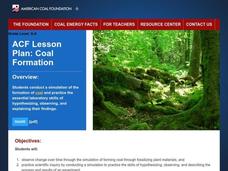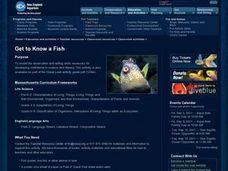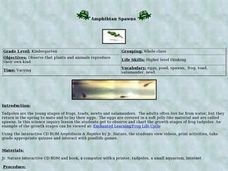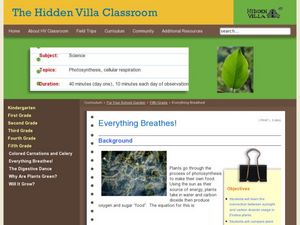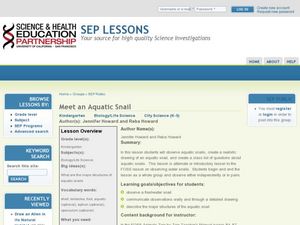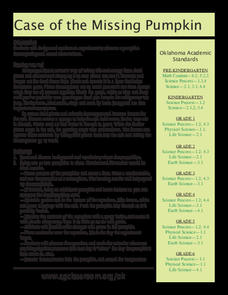ReadWriteThink
Webcams in the Classroom: Animal Inquiry and Observation
Boost observational skills with an inquiry-based lesson that takes scholars on a virtual field trip. With help from webcams, learners observe animals in a zoo or aquarium. Observations go into a journal and a discussion is held to review...
Curated OER
Algae in the Aquarium
Tenth graders determine the cause of an algal bloom in a classroom aquarium. Students analyze the situation and present a solution to the problem in the given time frame after researching and conducting experiments. Solutions are...
Curated OER
Invisible Life
By setting up an aquarium in the classroom, learners are able to describe some macroscopic and microscopic organisms that are found inside. This well-designed, and educationally rich lesson requires pupils to use microscopes to view...
Curated OER
Classroom Aquaponics: Exploring Nitrogen Cycling in a Closed System
Students investigate nutrient cycling in a simplified desktop ecosystem involving aquarium and hydro-ponically grown plants. They set up an aquarium with 10 gallons of water at least a week before the lab is planned and place...
Curated OER
Understanding the pH Cycle within the Aquarium
Students discuss places they have been where the air seemed hard to breathe. They discuss if they could "see" the humidity or smell. Students discuss ways this might relate to the fish in the aquarium. The teacher introduces pH and how...
Curated OER
Succession in the Classroom
Middle schoolers investigate their environment by growing plants in class. In this botany lesson plan, students discuss the lifespan of plants and animals and how they must be cared for continuously over time. Middle...
National Park Service
Living & Non-Living Interactions
What better way to learn about ecosystems than by getting outside and observing them first hand? Accompanying a field trip to a local park or outdoor space, this series of collaborative activities engages children in...
Curated OER
Coal Formation
Learners perform an in-depth study of coal - one of most important fossil fuels. Over a three-week period of time, they become familiar with how coal is formed underground, and will create a "fossil" right there in the classroom in order...
Curated OER
Get to Know a Fish
Learners discover the anatomy of a fish by identifying its body parts. In this oceanography lesson, students view a live fish in their classroom and draw a poster of the fish one body part at a time while identifying it....
Alabama Learning Exchange
Where is the Dirt? A Lesson in Hydroponics
Students use the Internet to research hydroponic gardening which is the growing of plants without soil. They participate in an experiment where a hydroponic garden is contructed in the classroom for observaion. They recorde information...
Curated OER
Create a Cloud in a Bottle
Students examine the earth's atmosphere. For this hands-on science lesson, students follow the outlined steps to create clouds in 2-liter bottles.
Curated OER
Investigation 3 - Terrariums / Aquariums
Third graders create aquariums or terrariums to explain how creatures depend on living and nonliving things.
Curated OER
Water Wonders
Students explore hydrology concepts. In this environment and biology lesson, students identify and describe macroinvertebrates using a variety of pictures and resources. Students observe and write about a classroom aquarium in which...
Curated OER
Science: Observing Fish Behavior
Young scholars identify and explain various fish behaviors through observation. Over several months, they watch one fish in the classroom aquarium and record its behaviors in notebooks. They visit a virtual aquarium Website to find...
Curated OER
What is Coral?
Students discuss what they know about coral reefs and are introduced to the importance of preserving coral reefs. In this coral reef lesson, students make connections between coral ecology in the classroom and in the real environment...
Curated OER
Case of the Missing Pumpkin
Students explore the process of decomposition in plants. In this plant biology activity, students use a cleaned out pumpkin and observe how the decomposition process takes place. Students write down adjectives to describe the pumpkin.
Curated OER
Amphibian Spawns
Students observe tadpoles as they gradually change into adults. In this amphibian biology lesson, students watch tadpoles in a tank in the classroom, keep a daily record of what they observe, and chart the growth development of the...
Curated OER
Brine Shrimp Hatching Experiment
Students hatch brine shrimp in a classroom experiment. In this hatching brine shrimp lesson, students participate in two-week lab in which they study how brine shrimp hatch under different conditions. They record data about the control...
Curated OER
Exploring Marine Ecosystems in the Caribbean and Maine
Students compare the marine habitats of Maine and the Caribbean using temperature, tides, ocean currents, latitude and longitude. In this marine ecosystems instructional activity, students analyze maps to complete graphic organizers that...
Curated OER
Everything Breathes!
Fifth graders test plants in the dark and in the light to see which grows better and produces more carbon dioxide. In this plants lesson plan, 5th graders also create ways for plants to go through photosynthesis that they can observe.
Curated OER
Light, Colors, and Vision
Third graders experience optic illusions by creating flipbooks. In this optics lesson, 3rd graders view a demonstration of the workings of rods and cones using a camera. They are shown an optical illusion and work to create their own...
Curated OER
Meet an Aquatic Snail
Students explore aquatic snails. In this life science lesson, students create a class list of questions about aquatic snails and begin to observe aquatic snails in the classroom. Students record observations.
Curated OER
Microfishing
Students use a simple method to collect living microorganisms from natural and/or artificial environments and develop skills in microscopy, observation, drawing, speculation, hypothesizing, oral presentation, and raising questions.
Curated OER
Case of the Missing Pumpkin
Scientists define and discuss decomposition, and watch pumpkins decompose and return to soil in classroom experiment. They record the date the experiment began, chart changes in pumpkins on a calendar, count how many days it takes...







